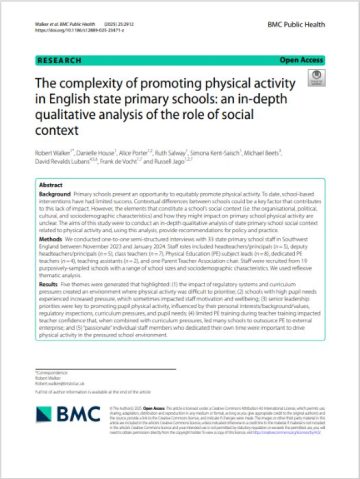The role of social context in promoting physical activity in primary schools
- 3 September 2025
A new study has highlighted the difficulties primary schools face in promoting physical activity, and the specific role the social context of a school plays in this. Pressure to deliver the curriculum means schools may rely on staff who are passionate about sport to promote physical activity, and schools with a high proportion of disadvantaged students may struggle.
The study, led by University of Bristol researchers and involving colleagues at the NIHR Bristol BRC and NIHR ARC West, is published in BMC Public Health. It is part of the UKRI-funded PASSPORT study, aimed at working with schools, children and families to develop a menu of physical activity options that schools can choose from to produce their own physical activity programme.
The importance of physical activity in schools
The World Health Organisation recommends that all children are active enough to speed up their breathing and heart rate, for an average of an hour each day. Yet, by the end of primary school, less than half of children in the UK achieve this.
Primary schools have an important role to play in helping all children equally to meet their daily physical activity requirements. Despite this, research has shown that most interventions to promote physical activity in schools have either been unsuccessful or achieved very little.
This may be because past interventions didn’t adequately consider their different settings and facilities or their organisational, political, cultural, and sociodemographic characteristics – their social context.
Seeking schools’ views
Researchers interviewed 33 staff at 19 diverse primary schools across Bristol to find out what affected their physical activity provision. They interviewed headteachers, deputy headteachers, class teachers, teaching assistants, physical education (PE) subject leads, dedicated PE teachers and a parent teacher association (PTA) chair.
Delivering a packed curriculum
School staff reported that they are under a lot of pressure to deliver what one study participant described as an “almost unachievably busy curriculum”.
On top of this, assessment of schools by the Office for Standards in Education, Children’s Services and Skills (Ofsted) puts pressure on staff to prioritise teaching English and maths, as schools are primarily assessed on these core subjects. This can mean other subjects, including physical activity, fall by the wayside.
Not a level playing field
The situation is even harder in schools with pupils who have high levels of need. Some schools have many pupils who experience poverty, speak English as an additional language, or have special educational needs and disabilities (SEND).
Meeting the needs of these pupils, which can include providing food and school uniform, as well as delivering the curriculum, leaves teachers little time or energy for promoting physical activity. This is despite the fact that providing physical activity in school may be even more important for these pupils, many of whom don’t have a garden at home.
Lack of training
Another barrier to providing physical activity in schools is lack of training. Teachers reported that they lacked confidence in delivering physical activities and felt they hadn’t been adequately trained.
Passion for sport
Because of these pressures on schools, the level of physical activity provision can depend on the attitudes of school leadership and staff towards sport.
The study found that school leadership played a key role in promoting physical activity. Faced with multiple pressures, schools where the senior staff have a personal interest in sport are more likely to promote it. Individual staff members with a passion for sport and a willingness to give up their own time can also drive physical activity provision.
Recommendations
On a policy level, the findings from this study indicate that the way schools are assessed needs to change, to reflect the importance of providing children with physical activity in schools. There is also a need for teacher training to include more focus on physical education.
The study also highlighted the importance of taking into account the social context of individual schools when designing interventions to promote school-based physical activity.
Professor Russ Jago, who leads the PASSPORT project, said:
“This work highlights that increasing physical activity in primary schools is complicated and there are many challenges that each school faces.
“These are different in each school, so we need to identify school-specific approaches that can take account of this social context to help more children be more active at school.”
